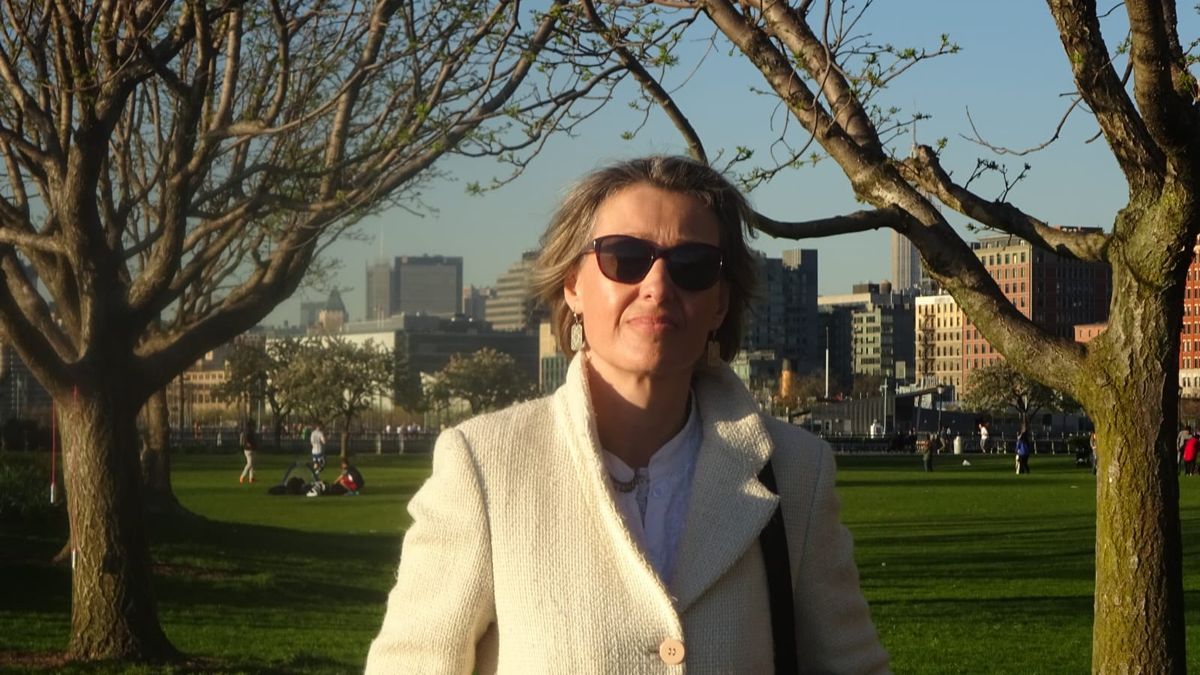Dystopian, choral novel of ideas “Urbanization X” (Seix Barral) of the Spanish Marta López Luaces warns the reader of a possible future. Lopez Luaces She lives alternately in Madrid, New York – where she is a professor at Montclair University – and Buenos Aires. She is an award-winning poet and storyteller. We dialogue with her.
Marta López Luaces: In urbanizations organized from A to Z. The former belong to the elite, the latter to the lower classes, where misery, overcrowding, and extreme temperatures prevail; Pollution has made the air unbreathable at times and there is a lack of water, among other things. Social advancement has become impossible.
M.L.L.: To see what New York was and what it is now. Today Manhattan is only for the upper middle class. This happens in many places where classes are no longer touched. In Central America, where crime is very high, “colonies” have been created as isolation and refuge. Well, here are the gated communities. Places that create a false feeling of security. Eventually, that kind of country becomes kind of like a little country.
Q: What happens in that society where countries are commercial centers and the world is run by a global administration of investors?
ML L: There are no longer citizens but values that are bought and sold. Depending on the capabilities you have is the value that is assigned to it. Commercialization and individualism have been taken to the extreme, human beings are valued for their economic capacity and nothing else.
Q: You, like George Orwell, used science fiction as a warning.
ALL: Science fiction talks about what is current, although the story takes place in the future. Orwell in “1984” anticipates what is happening. We are increasingly moving towards authoritarian states: Putin in Russia, Trump in the United States, Vox in Spain, etc. And people are voting for that, electing authoritarian governments. In 1548 Étienne de la Boétie in his “Discourse on Voluntary Servitude” observed that many times the population chooses tyrants to feel protected, even if they enslave them. The character who talks about this in the novel adds that power uses desire as a weapon of subordination.
Q: How did you construct a novel that talks about ecological disaster, femicides, women for prostitution or prostitution, narco-state governments?
MLL: In my novels I usually start from readings that unite various types of problems. People see the ecological problem on the one hand, racism on the other, feminicide on the other. Kevin Bles and Lauren Berlant explain that all of this comes from the same problem: the desire to control others, to feel superior. The destruction of the planet, racism and femicides arise from this desire to control the other. Reading Amartya Sen, Mark Fisher, Franco Berardi, Sayak Valencia of “Gore Capitalism”, we see that we have reached a capitalism so extreme that even death has become an economic good.
Q.: The novel shows both the auctioning off of women by a drug trafficker, for procreation or prostitution, and “the feminicide machine.”
MLL: Femicides are growing in all countries except Guatemala, where they were able to control them. In Germany, Russia, Mexico, the United States, Argentina they are increasing year after year. Thinking about this, I asked myself what would happen if in the future this did not stop, if there was no will to stop the destruction.
Q: Did you choose to publicize the blog of Uxia, the daughter of a drug lord, and the responses she receives, to make a choral novel?
MLL: I wanted many voices to speak about what was happening, to contradict each other, to have different opinions, to confront each other, to cast doubt on what others had maintained. Uxia has to do with something that is happening today. In the midst of devastation and marginality, in certain places, the only ones who escape from that world are the children of drug traffickers, who go to study at the best universities in the United States. Which shows that drug traffickers are becoming a political power in marginal countries.
Q: How did you arrive at the intimate portrait of the capo in the frame?
MLL: Reading reports, notes, reports. Above all, in Mexico, where there is a great journalist, Sergio González, Rodríguez, who died a year ago, who published articles, reports and notes where he describes in detail these terrible, ferocious, brutal and opulent characters. He showed how those drug lords what they wanted above all was to show off, to appear, to feel high class because of their jewelry, mansions, animals, servants. They wanted to be respected socially, even though they were locked up. Their frustration was that they couldn’t stop being drug traffickers.
Q: Does your dystopia have to do with that of “A Clockwork Orange”?
Q.: I refer in general to all the literature that emerged in the English language in the 70s and 80s, and especially to the novel by Anthony Burguess (in “Urbanization attraction of violence for violence. And gratuitous violence, even if it is painted as something else, is one of the great problems of today’s world. In the United States and in several European countries it does not stop increasing. Nobody knows why. No one knows how to determine precisely what the reasons are. It has always been said that people steal and kill because they are poor, because they lack things, so why does violence continue to grow in countries where there is not so much poverty? It seems that this current violence comes from psychological and emotional frustrations, among many young people. In the novel I refer to that.
Q: What are you up to now?
MLL: I am always working in different genres, now I am on a poetry book, and starting a novel.
Source: Ambito
I am an author and journalist who has worked in the entertainment industry for over a decade. I currently work as a news editor at a major news website, and my focus is on covering the latest trends in entertainment. I also write occasional pieces for other outlets, and have authored two books about the entertainment industry.




